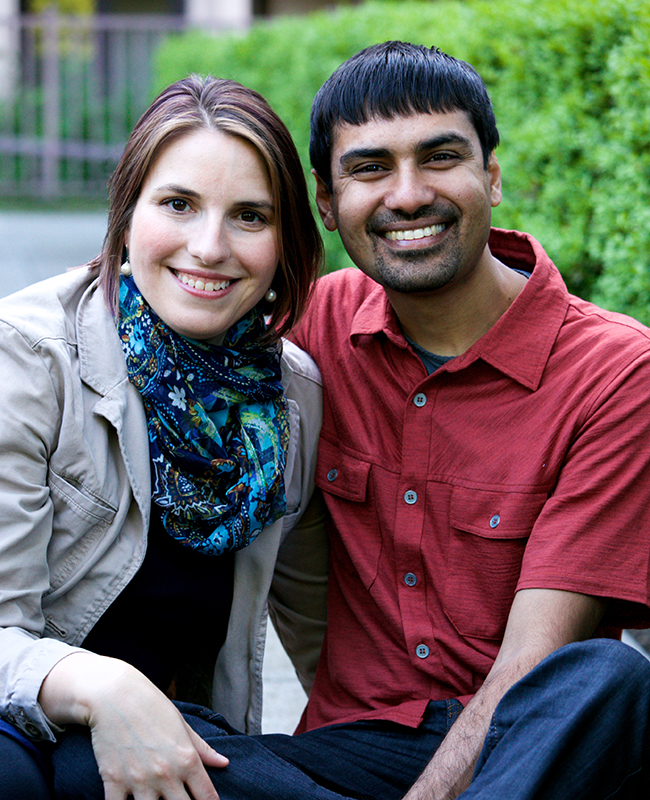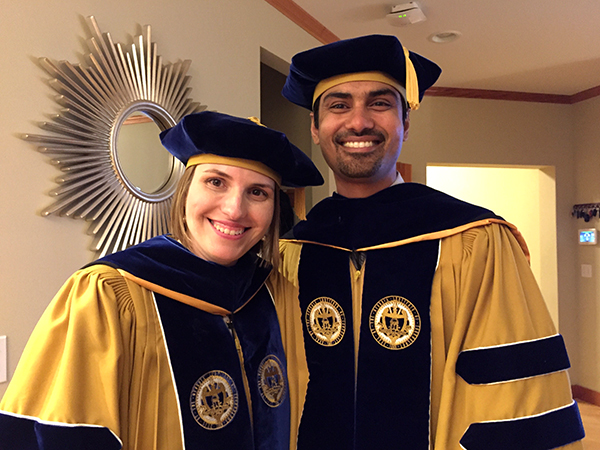The University of Washington has established a new endowed professorship, the Senosis–Paul G. Allen Endowed Professorship in Computer Science & Engineering, through the generosity of professors Shwetak Patel and Julie Kientz. The $1 million endowment, which was made possible in part by the acquisition of Patel’s mobile health startup Senosis Health by Google in 2017, will support recruitment and retention of Allen School faculty who pursue high-impact research aimed at solving meaningful, real-world problems for the benefit of society.
Patel directs the UW’s Ubiquitous Computing (UbiComp) Lab and holds the Washington Research Foundation Entrepreneurship Endowed Professorship in the Allen School and the Department of Electrical & Computer Engineering. Kientz serves as chair of the Department of Human-Centered Design & Engineering, where she directs the Computing for Healthy Living and Learning (CHiLL) Lab, and is an adjunct professor in the Allen School and the Information School. The pair joined the UW faculty in 2008 after earning their Ph.D.s from the Georgia Institute of Technology. Since arriving in Seattle, Patel and Kientz have applied their expansive view of computing to explore solutions for health care, education, environmental sustainability, and more.
The results have paid off not just for the university and the Seattle region, but also for society at large. Their success — and Patel’s direct experience with the benefits of holding an endowed professorship — inspired the couple to pay it forward by supporting future faculty members who, they hope, will not so much follow in their footsteps as blaze their own trails.
“As the beneficiary of the WRF Entrepreneurship Professorship, I have appreciated firsthand the role of endowments in enabling faculty to be creative and flexible in research. This kind of support empowers you to think outside the box and challenge existing assumptions,” explained Patel. “Julie and I hope that this new professorship will offer future faculty members that same freedom to pursue innovation that truly pushes the envelope — and pushes technology in new and unexpected directions that will have a positive impact on people’s lives.”
Thinking outside the box and pushing the limits of technology have been hallmarks of both Patel’s and Kientz’s research. Already in their careers, each of them has made groundbreaking contributions and set new directions for research that have established the UW as a leader in human-computer interaction, digital health, accessible technology, low-power sensing, and mobile computing.
Patel began his career focused on new capabilities for whole-home sensing. Recognizing that each appliance emits a distinct signal on a home’s electrical system, he and his students developed a technique for measuring power consumption at the individual device level with a single sensor. They later expanded their approach to monitoring water usage based on the pressure waves generated as each plumbing fixture is turned on and off. To commercialize this research, Patel and his team launched a company, Zensi, that was later acquired by Belkin. He followed that up with SNUPI Technologies, a company he and his collaborators started to commercialize a consumer-facing whole-home sensing system called WallyHome, which was subsequently acquired by Sears.
Inspired by the global growth in smartphone use, Patel began exploring how he and his team could leverage the increasingly sophisticated sensors built into today’s mobile devices to aid in the early detection and monitoring of disease — pioneering an entirely new field focused on mobile health sensing that has become even more compelling since the outbreak of the COVID-19 pandemic. By combining sensing data from inputs like the phone’s camera, microphone and accelerometer with new machine learning algorithms, Patel’s lab has worked with health care providers on a variety of health monitoring tools. Patel and a group of collaborators started Senosis Health with a view to commercializing their initial work in this space. The team also approached the Food and Drug Administration to obtain approval for the use of mobile apps in both clinical and at-home settings — a novel idea at the time, as the agency had no prior experience with mobile app development.
Since Google’s acquisition of Senosis three years ago, Patel has built on this work as the leader of the company’s Seattle-based engineering team focused on mobile health technologies. He hopes that by leveraging the acquisition to establish a new professorship, more faculty will be inspired to unite academic research with entrepreneurial impact.
“Being an entrepreneur has helped me to identify research problems I wouldn’t have previously considered solely as an academic,” Patel explained last year when he received the ACM Prize in Computing — the premier mid-career award in the field of computer science — from the Association for Computing Machinery. “That experience opened up opportunities for me to venture down research paths I wouldn’t have otherwise thought about.”
In addition to supporting an entrepreneurial mindset and a more expansive view of the role of academic research, Patel and Kientz also hope that holders of the professorship will model a commitment to diversity and inclusion in computing through their teaching, outreach, and service.
“We need to design and develop computing technology for all of society, not just a privileged subset. One of the ways we make sure we do that is to make the computing discipline representative of the people we are trying to serve,” Kientz said. “Shwetak and I feel strongly that our duty as educators and as researchers is to advance technologies and create an academic community that reflects a rich diversity of backgrounds and experiences. It’s important to us that the holders of this professorship also model these values.”
Kientz is keenly aware of the power of technology and education to be the great equalizer, and in more ways than one. Her research takes a human-centered approach to technology, combining ubiquitous computing, human-computer interaction, and informatics to design and study novel interactive technologies for health and education while also working to understand and reduce the burden technology places on the people who use it. It’s an approach that she honed early in her career, when she explored technology to support caregivers of young children in data-based decision-making. Rather than approach the topic solely as a computer scientist, though, Kientz spent significant time among the communities for whom she was designing — giving her firsthand insight into how technology could best support their work by, for example, making tracking childhood development data more fun and meaningful by linking it with sentimental mementos in a digital baby book and allowing it to be shared with family and friends.
Since then, Kientz and her students have developed tools to help people improve their sleep quality, support physical fitness goals of people with visual impairments, support inclusive education, help parents teach their children to self-regulate screen time, and to monitor children’s developmental progress. Her work on the latter led her to work on the launch of startup, BrightSteps, to assist parents and caregivers in monitoring children’s development and connecting them to resources.
The Senosis–Paul G. Allen Professorship leverages funds made available through the Paul G. Allen Professorship Matching Program. That program, which is supported by earnings of the endowment established by Mr. Allen and Microsoft upon creation of the school, provides a 1:2 match on individual gifts aimed at attracting and retaining exceptional faculty who will advance UW’s leadership in computer science education and research.
The professorship is one of two UW initiatives announced today and funded with gifts from the couple. The other is a gift to Kientz’s home department to create the Kientz & Patel HCDE Student Emergency Support Fund. That gift will offer support to students facing near-term financial hardship, such as unexpected health care costs, car repairs, legal fees, emergency travel, and housing insecurity. The goal, Kientz explains, is to alleviate the burden for students who suddenly find themselves facing unexpected financial emergencies.
“Students who cannot make a rent payment may struggle with housing security, or one unpaid bill can begin to collect fee upon fee, quickly making payment completely unattainable,” she said. “This can make the difference between being able to stay in school or have to drop out.”
“Julie and Shwetak are both superstars who have enriched our university, our community, and our field in countless ways,” said professor Magdalena Balazinska, Director of the Allen School. “Time and again, they have demonstrated in tangible ways how technology can help solve some of society’s most vexing problems — from addressing disparities in education and health care, to conserving natural resources for a more sustainable planet. They are also both dedicated members of our community, supporting our mission through their service roles as department chair and associate director for research and innovation. With these gifts, they are once again leading the way in showing how UW faculty are truly a force for good.”
The Senosis–Paul G. Allen Professorship will become the Shwetak N. Patel & Julie A. Kientz–Paul G. Allen Endowed Professorship when the couple eventually become emeritus faculty or retire from the university. The professorship is the third endowment in the Allen School created as the result of faculty entrepreneurial activity. In 2017, the Guestrin Endowed Professorship in Artificial Intelligence and Machine Learning was established following Apple’s acquisition of Carlos Guestrin’s machine learning startup Turi. And the establishment of the Washington Research Foundation Entrepreneurship Endowed Professorship — the professorship held by Patel — was related to the acquisition by Microsoft of Oren Etzioni’s startup Farecast.
Way to go, Shwetak and Julie — thank you for your leadership and your generous support of faculty and students!




